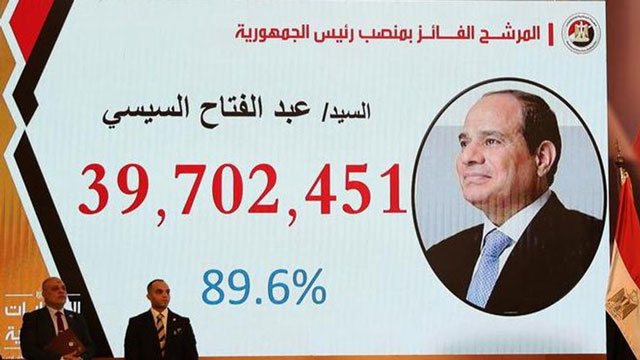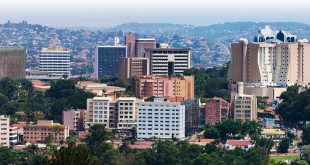
CAIRO, EGYPT | Xinhua | Abdel-Fattah al-Sisi, Egypt’s incumbent president, won the 2024 presidential election with 89.6 percent of the vote, securing a third term in office, according to results released Monday afternoon by Egypt’s National Election Authority (NEA).
Sisi has thus become the chosen leader of the most populous Arab country, which has played a pivotal role in Middle Eastern politics. As experts have reckoned, the Egyptians recognize and value his accomplishments in his previous two terms.
Addressing the nation after the announcement of the election results, Sisi said, “Choosing me for the mission of leading the country is a responsibility that I bear faithfully.”
WIN AGAINST HEADWIND
According to the data released by the NEA, the turnout of the presidential election reached approximately 66.8 percent of the total 67 million eligible voters. The incumbent president secured a substantial majority, repeating his victories in the 2014 and 2018 elections.
In a speech delivered soon after the official result came out, Sisi extended gratitude to people coming to vote at a time when “the state is grappling with a multitude of challenges across all levels.”
His re-election came amid massive outcries at home and beyond against the conflict in the Gaza Strip.
“They (Egyptians) think Sisi, as a former defense minister, is best placed to deal with the situation,” Suez Canal University professor of political economy, Gamal Zahran, was quoted by Egypt’s state-run Ahram Online news website as saying.
“Sisi, aside from launching major economic projects, has freed Egypt from political upheaval and sectarian conflict, rebuilt state institutions, and restored Egypt’s role in the regional and international arena,” Mustafa Adnan, a 42-year-old salesman in downtown Cairo, told Xinhua after voting for the incumbent.
As has been widely recognized, since taking power in 2014, Sisi has planned Egypt’s development with clear ideas, including infrastructure improvement like building a new administrative capital east of Cairo, stimulating foreign investment, and creating more job opportunities.
REDRESS BALANCE
Heading for another six-year term in office, Sisi is expected to bring about solid outcomes of national strategies especially those aimed at securing a buoyant economy, while tackling various domestic challenges.
The country has been exploring ways to effectively restore growth momentum, curb the national currency’s devaluation, increase Forex reserves, and rein in inflation and unemployment rates, according to Zou Zhiqiang, a researcher at the Middle East Studies Center at Fudan University.
Sisi has also struck a delicate balance between alleviating burdens on the needy who bore the brunt of a structural reform featuring privatize efforts, cutting government subsidies on basic commodities to reduce fiscal burden, and protecting the vulnerable from the soaring cost of living.
In the future, stronger efforts are expected to secure more financial injections, such as new aid from Gulf countries, to keep the national economy afloat in a sea of internal and external turbulence, said Zou.
Geopolitical uncertainties are another factor that has put Egypt’s economic growth on a bumpy path. Egypt has revised down its growth projection for Financial Year 2023-24 to 3.5 percent, Hala El-Said, minister of planning and economic development, said in early December, attributing the downward revision to a series of external shocks, including the Gaza conflict.
RESTORE REGIONAL SECURITY
In the lead-up to the presidential election earlier this month, Sisi briefed Putin in a phone call on Cairo’s ongoing efforts to push for a ceasefire in Gaza to prevent “further deterioration of the miserable humanitarian situation.”
While urging both sides to de-escalate, Egypt has kept the Rafah crossing open for medical aid, food, and fuel delivery to the much-needed Gaza while stepping up talks with regional and international leaders to secure more aid delivery.
In November, Sisi reaffirmed Egypt’s strong rejection of forcibly deporting the Palestinians from either Gaza or the West Bank to Egypt and Jordan, saying such moves risk liquidating the Palestinian cause or harming Egypt’s national security.
As the only Arab country with a common land border with the Gaza Strip, Egypt’s presidency and diplomatic establishment have tried to damp regional spillover from the situation in Gaza.
On top of the Gaza conflict to the east, Egypt is also facing crises and conflicts in Libya to the west and Sudan to the south.
Egypt, under Sisi’s rule, has acted as a major mediator for political reconciliation in these countries to foster a safe environment in its border regions.
In July, Sisi hosted a meeting in Egypt between high-ranking delegates of Palestinian factions, including Palestinian President Mahmoud Abbas, and Hamas politburo members, to cement the Palestinian national unity.
REKINDLED AMBITION
Sisi has also engaged Egypt in key multilateral and Global South cooperation like BRICS and the Belt and Road Initiative.
In tandem with its ambition to leverage regional weight, Egypt, under Sisi’s leadership, restored diplomatic ties with Türkiye and made solid rapprochement efforts with Syria and Iran in 2023.
Ezzat Saad, director of the Egyptian Council for Foreign Affairs, said “the efficiency, effectiveness, and flexibility that the Egyptian diplomacy has demonstrated, especially in the past 10 years, raised optimism about its ability to achieve its goals, in a way that serves common interests and promotes security and stability in the region.”
When Sisi assumed the presidency in 2014, China and Egypt jointly upgraded China-Egypt relations to a comprehensive strategic partnership. As one of the first countries to join the China-proposed Belt and Road Initiative, Egypt has greatly improved its transportation and logistics and boosted its economic development, said Egyptian Prime Minister Mostafa Madbouly.
Besides, Egypt is the first country in the Middle East and North Africa to issue sustainable panda bonds, with Egyptian Finance Minister Mohamed Maait describing the issuance as “a new portal for achieving sustainable development goals.”
Tarek Fahmy, professor of political science at Cairo University, said, “Egypt’s accession to BRICS with the support of Beijing and Moscow will open up a large space in Egyptian international relations.”
Envisioning six more years as president of Egypt, Sisi vowed in his speech to “rekindle the covenant to dedicate every effort” to continue to build Egypt into a democratic and inclusive state, uphold the law and constitution, and advance firmly and steadfastly toward modernity and growth, while preserving its unique culture and fostering a decent life for every countryman. ■
 The Independent Uganda: You get the Truth we Pay the Price
The Independent Uganda: You get the Truth we Pay the Price


